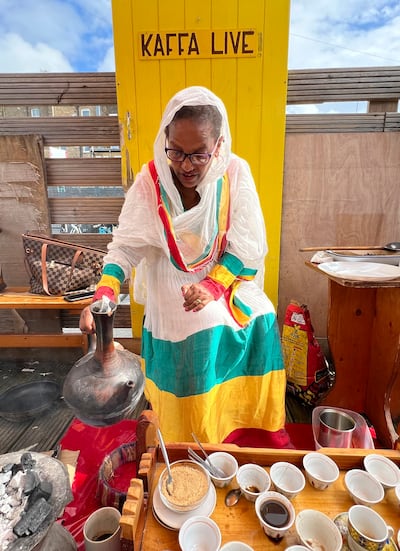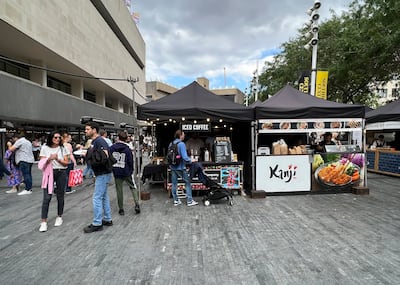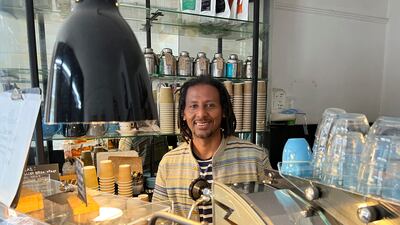Growing up in Ethiopia, Yared Markos would often start his days the same way: with coffee. Family members, neighbours and passers-by would be drawn in by the strong aroma of fresh beans roasting in a pot, often made by his mother or another family member.
Regardless of who they were, all were welcome.
And this tradition wasn’t limited to the morning. Coffee, or buna in Amharic, is typically drunk at the end of each meal. Drinking coffee was a communal experience for Markos, so when he first immigrated to London from Ethiopia 23 years ago, the culture shock hit hard.
“They sell our coffee in Starbucks and other places but they don’t follow our traditions,” said Markos, who has owned Kaffa Coffee since 2004. The shop, now in the East London neighbourhood of Dalton, hosts coffee ceremonies every weekend in the summer, as well as during cultural events year round, and special orders.
“Tourists will walk by and smell the coffee and come in asking questions,” Markos said. “It makes people want to learn more about the culture.”
Markos said that when he moved to London, in 2000, he didn’t see any Ethiopian coffee shops. Now, there are more than a dozen all over a city where tea, its counterpart, has been a staple for centuries. Ethiopian coffee has made similar inroads in cities around the world.
Among some of the most popular Ethiopian-origin coffee types are the floral Yirgacheffe, fruity Limu and nutty Kochere.
Markos named Kaffa after the southwestern region in Ethiopia where coffee beans are believed to have been discovered around 800AD. Traditional accounts say an Ethiopian goat herder named Kaldi noticed his goats acting strangely one day after eating berries from a tree. He tried them himself, and felt energised and alert. Kaldi took the berries to a monk, who threw them in a fire, calling them the work of the devil.
Social value
A strong aroma was released, and the monks saved the remnants of the burnt beans, putting them in a jug with hot water. When they drank the concoction, they realised it helped them stay awake during nightly devotions and prayers.
Over the years, coffee-making in Ethiopia has evolved into full-on ceremonies led by the women in a household.
“The social value of the coffee ceremony is one of our biggest traditions,” Markos said.
Fresh beans are roasted in a pot for a few minutes before being passed around, so everyone can inhale the flavourful fumes. They are then ground down to a powder and placed inside a jebena, or Ethiopian coffee pot, traditionally made of clay, on top of a stove.
While the coffee is being made, itan, or frankincense, is burnt to enhance the already aromatic process. Once the kettle comes to a boil several times, the coffee is served in a small cup called a sini.
Almost a decade ago, the International Coffee Organization, which has 77 member countries and is headquartered in London, officially marked October 1 as International Coffee Day. This year, the theme is the promotion of a safe and healthy working environment in the coffee supply chain.
The London Coffee Festival, started in 2011, also provides an occasion for coffee lovers to come together. Anteneh Mulu, co-owner of The Ethiopian Coffee Company shop in central London, credits the festival with helping to promote Ethiopian coffee to a new community.
Mulu, 46, and his business partner Polly Hamilton, 79, opened their shop in 2013. Like Kaffa Coffee, they import directly from Ethiopia, where beans are often named after the region they were grown in – paying homage to the motherland in name and practice.
As Ethiopia's traditions spread outside the country, both Markos and Mulu hope more people will be encouraged to prioritise community over caffeine while drinking coffee.
South Africa squad
: Faf du Plessis (captain), Hashim Amla, Temba Bavuma, Quinton de Kock (wkt), Theunis de Bruyn, AB de Villiers, Dean Elgar, Heinrich Klaasen (wkt), Keshav Maharaj, Aiden Markram, Morne Morkel, Chris Morris, Wiaan Mulder, Lungi Ngidi, Duanne Olivier, Vernon Philander and Kagiso Rabada.
RESULTS
6pm: Mazrat Al Ruwayah – Group 2 (PA) $40,000 (Dirt) 1,600m
Winner: AF Alajaj, Tadhg O’Shea (jockey), Ernst Oertel (trainer)
6.35pm: Race of Future – Handicap (TB) $80,000 (Turf) 2,410m
Winner: Global Storm, William Buick, Charlie Appleby
7.10pm: UAE 2000 Guineas – Group 3 (TB) $150,000 (D) 1,600m
Winner: Azure Coast, Antonio Fresu, Pavel Vashchenko
7.45pm: Business Bay Challenge – Listed (TB) $100,000 (T) 1,400m
Winner: Storm Damage, Patrick Cosgrave, Saeed bin Suroor
20.20pm: Curlin Stakes – Listed (TB) $100,000 (D) 2,000m
Winner: Appreciated, Fernando Jara, Doug O’Neill
8.55pm: Singspiel Stakes – Group 2 (TB) $180,000 (T) 1,800m
Winner: Lord Glitters, Daniel Tudhope, David O'Meara
9.30pm: Al Shindagha Sprint – Group 3 (TB) $150,000 (D) 1,200m
Winner: Meraas, Antonio Fresu, Musabah Al Muhairi
Western Region Asia Cup T20 Qualifier
Sun Feb 23 – Thu Feb 27, Al Amerat, Oman
The two finalists advance to the Asia qualifier in Malaysia in August
Group A
Bahrain, Maldives, Oman, Qatar
Group B
UAE, Iran, Kuwait, Saudi Arabia
WHY%20AAYAN%20IS%20'PERFECT%20EXAMPLE'
%3Cp%3EDavid%20White%20might%20be%20new%20to%20the%20country%2C%20but%20he%20has%20clearly%20already%20built%20up%20an%20affinity%20with%20the%20place.%3Cbr%3E%3Cbr%3EAfter%20the%20UAE%20shocked%20Pakistan%20in%20the%20semi-final%20of%20the%20Under%2019%20Asia%20Cup%20last%20month%2C%20White%20was%20hugged%20on%20the%20field%20by%20Aayan%20Khan%2C%20the%20team%E2%80%99s%20captain.%3Cbr%3E%3Cbr%3EWhite%20suggests%20that%20was%20more%20a%20sign%20of%20Aayan%E2%80%99s%20amiability%20than%20anything%20else.%20But%20he%20believes%20the%20young%20all-rounder%2C%20who%20was%20part%20of%20the%20winning%20Gulf%20Giants%20team%20last%20year%2C%20is%20just%20the%20sort%20of%20player%20the%20country%20should%20be%20seeking%20to%20produce%20via%20the%20ILT20.%3Cbr%3E%3Cbr%3E%E2%80%9CHe%20is%20a%20delightful%20young%20man%2C%E2%80%9D%20White%20said.%20%E2%80%9CHe%20played%20in%20the%20competition%20last%20year%20at%2017%2C%20and%20look%20at%20his%20development%20from%20there%20till%20now%2C%20and%20where%20he%20is%20representing%20the%20UAE.%3Cbr%3E%3Cbr%3E%E2%80%9CHe%20was%20influential%20in%20the%20U19%20team%20which%20beat%20Pakistan.%20He%20is%20the%20perfect%20example%20of%20what%20we%20are%20all%20trying%20to%20achieve%20here.%3Cbr%3E%3Cbr%3E%E2%80%9CIt%20is%20about%20the%20development%20of%20players%20who%20are%20going%20to%20represent%20the%20UAE%20and%20go%20on%20to%20help%20make%20UAE%20a%20force%20in%20world%20cricket.%E2%80%9D%C2%A0%3C%2Fp%3E%0A
List of alleged parties
- May 15 2020: Boris Johnson is said to have attended a Downing Street pizza party
- 27 Nov 2020: PM gives speech at leaving do for his staff
- Dec 10 2020: Staff party held by then-education secretary Gavin Williamson
- Dec 13 2020: Mr Johnson and his then-fiancee Carrie Symonds throw a flat party
- Dec 14 2020: Shaun Bailey holds staff party at Conservative Party headquarters
- Dec 15 2020: PM takes part in a staff quiz
- Dec 18 2020: Downing Street Christmas party
Racecard
6.30pm: The Madjani Stakes (PA) Group 3 Dh175,000 (Dirt) 1,900m
7.05pm: Maiden (TB) Dh165,000 (D) 1,400m
7.40pm: Maiden (TB) Dh165,000 (D) 1,600m
8.15pm: Handicap (TB) Dh190,000 (D) 1,200m
8.50pm: Dubai Creek Mile (TB) Listed Dh265,000 (D) 1,600m
9.25pm: Handicap (TB) Dh190,000 (D) 1,600m
The National selections
6.30pm: Chaddad
7.05pm: Down On Da Bayou
7.40pm: Mass Media
8.15pm: Rafal
8.50pm: Yulong Warrior
9.25pm: Chiefdom
The specs: 2019 Lincoln MKC
Price, base / as tested: Dh169,995 / Dh192,045
Engine: Turbocharged, 2.0-litre, in-line four-cylinder
Transmission: Six-speed automatic
Power: 253hp @ 5,500rpm
Torque: 389Nm @ 2,500rpm
Fuel economy, combined: 10.7L / 100km
More on Quran memorisation:
Last 10 winners of African Footballer of the Year
2006: Didier Drogba (Chelsea and Ivory Coast)
2007: Frederic Kanoute (Sevilla and Mali)
2008: Emmanuel Adebayor (Arsenal and Togo)
2009: Didier Drogba (Chelsea and Ivory Coast)
2010: Samuel Eto’o (Inter Milan and Cameroon)
2011: Yaya Toure (Manchester City and Ivory Coast)
2012: Yaya Toure (Manchester City and Ivory Coast)
2013: Yaya Toure (Manchester City and Ivory Coast)
2014: Yaya Toure (Manchester City and Ivory Coast)
2015: Pierre-Emerick Aubameyang (Borussia Dortmund and Gabon)
2016: Riyad Mahrez (Leicester City and Algeria)
ABU%20DHABI'S%20KEY%20TOURISM%20GOALS%3A%20BY%20THE%20NUMBERS
%3Cp%3EBy%202030%2C%20Abu%20Dhabi%20aims%20to%20achieve%3A%3C%2Fp%3E%0A%3Cp%3E%3Cstrong%3E%E2%80%A2%2039.3%20million%20visitors%2C%3C%2Fstrong%3E%20nearly%2064%25%20up%20from%202023%3C%2Fp%3E%0A%3Cp%3E%3Cstrong%3E%E2%80%A2%20Dh90%20billion%20contribution%20to%20GDP%2C%3C%2Fstrong%3E%20about%2084%25%20more%20than%20Dh49%20billion%20in%202023%3C%2Fp%3E%0A%3Cp%3E%3Cstrong%3E%E2%80%A2%20178%2C000%20new%20jobs%2C%3C%2Fstrong%3E%20bringing%20the%20total%20to%20about%20366%2C000%3C%2Fp%3E%0A%3Cp%3E%3Cstrong%3E%E2%80%A2%2052%2C000%20hotel%20rooms%2C%3C%2Fstrong%3E%20up%2053%25%20from%2034%2C000%20in%202023%3C%2Fp%3E%0A%3Cp%3E%3Cstrong%3E%E2%80%A2%207.2%20million%20international%20visitors%2C%3C%2Fstrong%3E%20almost%2090%25%20higher%20compared%20to%202023's%203.8%20million%3C%2Fp%3E%0A%3Cp%3E%3Cstrong%3E%E2%80%A2%203.9%20international%20overnight%20hotel%20stays%2C%3C%2Fstrong%3E%2022%25%20more%20from%203.2%20nights%20in%202023%3C%2Fp%3E%0A
Sanju
Produced: Vidhu Vinod Chopra, Rajkumar Hirani
Director: Rajkumar Hirani
Cast: Ranbir Kapoor, Vicky Kaushal, Paresh Rawal, Anushka Sharma, Manish’s Koirala, Dia Mirza, Sonam Kapoor, Jim Sarbh, Boman Irani
Rating: 3.5 stars
Wicked: For Good
Director: Jon M Chu
Starring: Ariana Grande, Cynthia Erivo, Jonathan Bailey, Jeff Goldblum, Michelle Yeoh, Ethan Slater
Rating: 4/5
Countdown to Zero exhibition will show how disease can be beaten
Countdown to Zero: Defeating Disease, an international multimedia exhibition created by the American Museum of National History in collaboration with The Carter Center, will open in Abu Dhabi a month before Reaching the Last Mile.
Opening on October 15 and running until November 15, the free exhibition opens at The Galleria mall on Al Maryah Island, and has already been seen at the Jimmy Carter Presidential Library and Museum in Atlanta, the American Museum of Natural History in New York, and the London School of Hygiene and Tropical Medicine.
UAE currency: the story behind the money in your pockets
UAE currency: the story behind the money in your pockets



